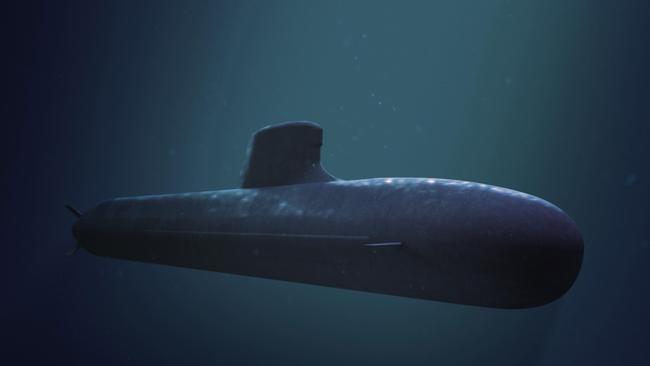Submarine deal: Lockheed keeps workforce as it exits contract
Lockheed Martin says it has finalised its exit from a $700m contract to design the weapons system for the scrapped submarine deal which could cost the taxpayers $5.5bn.

Business
Don't miss out on the headlines from Business. Followed categories will be added to My News.
Defence has taken another step towards its exit from the cancelled submarine contract, but a key industry group says the new government needs to act quickly to restore confidence in the sector.
A Senate hearing heard in April it could still cost another $3bn to wind down contracts for the cancelled submarine contract with French firm Naval Group, on top of the $2.5bn already spent working on the Attack-class submarines. While negotiations are continuing with Naval, Lockheed Martin Australia confirmed to The Australian it has finalised its exit from a $700m contract to design the weapons systems for the abandoned submarines.
Lockheed Martin was awarded the contract in 2016, and had more than 240 local employees – about 20 per cent of its 1200-strong Australian workforce – working on the project when it was cancelled by the Coalition in September.
A spokesman for Lockheed said it had settled the termination of its contract without the payment of any “settlement amount”.
“Lockheed Martin Australia’s portion of the contract has concluded,” he said. “There is no set-tlement amount associated with the finalisation of the contract for Lockheed Martin Australia.”
Lockheed Martin Australia chief executive Warren McDonald said more than 95 per cent of its workforce assigned to the project had been redeployed within the company, with most assigned to other contracts with the Australian Defence Force.
“We worked collaboratively and successfully with our customer and supply chain to achieve a smooth and efficient transition out of the submarine contract,” he said. “In parallel, we worked closely with our staff to redeploy their valuable skillsets and experience to other priority areas within Lockheed Martin Australia.”
Lockheed Martin Australia’s 2021 financial statements show the company booked $912.3m in revenue, up 80 per cent. It booked an after-tax profit of $36.2m.
But while Lockheed was able to retain the bulk of its staff working on the subs, evidence from Defence officials to the Senate Estimates committee in April sug-gested Naval Group had already shed about 75 per cent of its 360-strong workforce, and Australian Industry and Defence Network chief executive Brent Clark said the cancellation was still reverberating through smaller contractors in the industry.
The AIDN represents small and medium Australian defence industry companies, and Mr Clark said negotiations over other cancelled submarine contracts were ongoing, with no process in sight for the replacement nuclear submarines.
Other major defence contracts are also facing delays and cancellations – including last year’s decision to abandoned the troubled Tiger Tiger Armed Reconnaissance Helicopter in favour of buying a fleet of Apache helicopters from the US, and the April decision of the Morrison government to axe a $1.3bn program to buy armed drones, leaving the former government’s plans to build its manufacturing policy around defence contractors in disarray.
An update to the Naval Shipbuilding plan was still to be released, Mr Clark said, despite having been delivered to then-defence minister Peter Dutton in late 2021, creating further uncertainty. Mr Clark said defence contractors hoping to win work from the local manufacturing strategy were now facing intense competition for skilled labour from the booming resources sector, and the incoming government needed to act quickly to reset its plans.
“Companies were expecting to get work in those programs and now those programs are gone,” he said. “When that occurs, people leave. If I were an employee … why would I not go into the offshore oil and gas or mining industry because that is guaranteed work.
“That’s not going away.”
“For the incoming government, their problem is going to be regenerating confidence in the industry – and also keeping industry interested. People often forget that for a lot of the small to medium enterprises, defence work is a component of their work. It‘s not all their work. If it is unreliable they’re not going to bother anymore. And then our ability to create an industrial base is impacted.”
While smaller contractors may be struggling to come to terms with the swift reversal of the political fortunes of some parts of the sector, accounts filed with the corporate regulator show defence is still big business in Australia.
Revenue for the Australian arms of three of the biggest contractors to the ADF – BAE Systems, Lockheed Martin Australia and Raytheon Australia – show their combined revenue topped $3.1bn in 2021, up almost 23 per cent from 2020.
Originally published as Submarine deal: Lockheed keeps workforce as it exits contract



